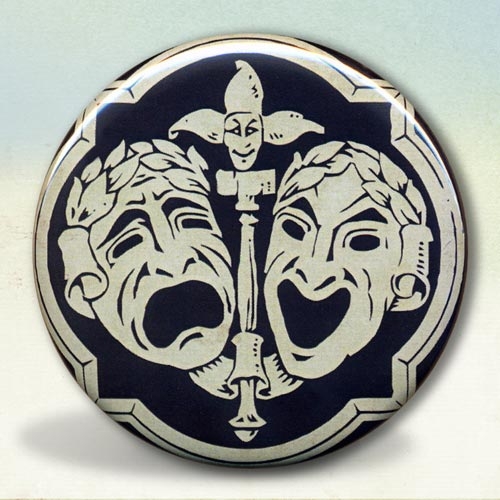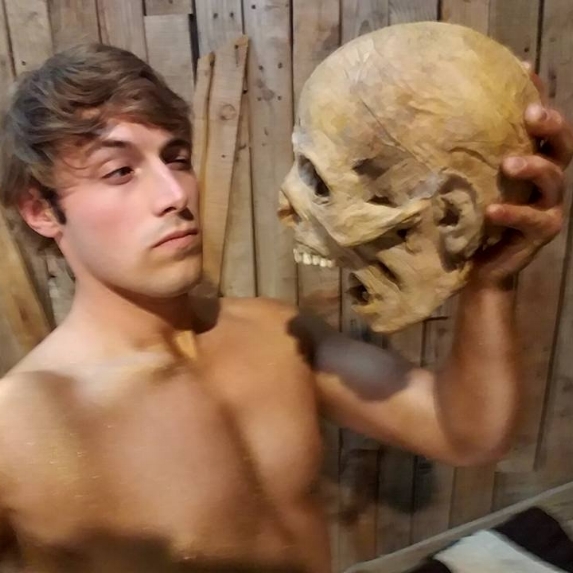It is fall, here in Southern California, as such the days are growing shorter, and the need for physical recreation now turns to mental recreation, as the daylight hours decrease, and hours spent indoors increases.
One preoccupation besides the Football games that can move one indoors is the Fall-Winter Theater Season: This can include anything from state-of-the-art theaters to a world-renowned symphony and a multitude of live performances. I’d suggest giving a live stage performance a go. Much that I have learned about human interaction, or what I now know about my own inner-personal interactions was revealed to me in a non-combative observational way, presented to me as a live on-stage event.
Granthan Coleman Playing Hamlet 2017
I began looking for these revelations about life in earnest, after hearing my Teacher Thane, tell about these insights in his class lectures for the Prosperos. (lectures on self-observation and self-awareness.) He would reference live theatrical performance or musicals as a way to unlock some unknown factor, to perceive something about our situation that we normally would not see, a place of authenticity, or Truth based reality rather than based on sense testimony alone.
In the FootLights LA, a theatrical publication handed out to me at a recent musical performance of Cabaret, besides information on the cast and production of Cabaret, the publication had a story that will illustrate my point. The article was written by Peter Finlayson, and was called “Blame it on Theatre.” The article had a resonance with me and this concept of seeing beyond sense testimony as well as the function of Theatre. -Calvin
"I’ve found myself in an interesting position of late. Through the genius of social media, I’ve had the opportunity of being reacquainted with people I’ve not seen since I came to California. Back in 1981, it means I’ve had a bit of catching up to do. The first thing I discovered was that for those that were true friends, well, we are still friends. Getting past all the ‘what have you been up to’ took about a nano-second before we were back to conversation and feelings we shared as if we hadn’t missed a beat in 35 plus years.
What was a little surprising was that even though I am still most assuredly a child of the 60’s and an unabashed left-leaning liberal, many of my old friends had adopted a more conservative position. So has always been my want, political discussion quickly ensued, and the current political climate certainly added fuel to the debate.
At the same time, I’ve also had opportunity to engage with my more recently acquired friends, mostly theatre-makers, on the same topics. The resulting conversations really bought me to think – how did I, a radical loud mouthed protester who’d marched on Washington, the capital not the man, suddenly appear to be opposed to both right and left, positions that were being vociferously expressed to me by people I assumed to share values.
I’ve become a centrist? Not possible!
Thank god, those that were friends are still friends, and no permanent scars were created. But why was it that I was arguing against both sides, this is all in regard to free speech, and I was essentially saying the exact same thing to both, and being met with exhaustive fervency in opposition.
I blame it on Theatre!
What? Yep! My passion for change has been tempered by my passion for theartre. For a while I was feeling a bit like Data on Star Trek, Next Generation, rapidly scanning my memories as to what has influenced me the most to seek a position of principal with the understanding that the principal has limitations.
Theartre always serves as an allegory, and in the 3-plus millennia of recorded history, there is an over-riding principle that is essentially the moral of virtually every play. Moderation. Heroes become tragic when they act in haste or out of self-interest. In comedy, heroes become fools when acting for the same reasons. Causes are not noble if concern for “others” is not part of the equation
Photo Jimmy Flint-Smith Actor Model
Before you scream foul and yell that theatre is not a voice of caution, hear me out. It is not caution that drives theatre, it is understanding. It is the demand that for me to reflect upon the evil men do, I must first understand that they come not from a position of evil, but from a position of self-interest. “My morals are more important”, “my wants are more immediate”, “my judgement is superior”.
Theatre teaches us the nuances, the difference between caution and moderation. Theatre teaches us that we may be individuals, but are more assuredly a par of the whole. What impacts us, impacts everyone.
In its very process of creating a living play, the moderation I speak of is demanded of everyone at every level. A play, a musical, is the very essence of the social experience.
The participants, from writer to stagehand, are individuals. Each has a vision and a want to execute the play to bring a sense of fulfillment to the audience. Yet the writer ultimately knows that there are words that will change. The actor knows that the director is there to make sure the performance fits the scene. The designer may want the best set he or she has ever created, but it must serve the play.
Individually we are as the theatre-makers. Our will, our reason, our logic, dictates that certain things must occur for the betterment of humanity. The merits of the effort are determined not by the contributor, but the reality of value perceived by those around us. In a very real sense it is the whole of humanity that determines what is best.
Stage Production of Blood Brothers
For more than 3,000 years, theatre has expressed the position that the consequence of action is more important than the action itself. It demands of both artist and audience to take a journey of understanding and at conclusion, become aware that intent is never the cause of the conclusion, intent is only a catalyst to a journey.
The beauty that is expressed in theatre is that we must take the journey. We must examine the life we witness, we must encourage action, but we must do so with the weight of humanity upon our shoulders.
So what’s the take away? Jacques in Shakespeare’s “As You Like It” tells us, “All the world’s a stage, and all the men and women merely players….” While the monologue is about Life played out in stages . . . I think it also an admonition. Play the role; fit into the moment.
Respect ourselves for the roles we play, but accept that our wants will not be the determiner of accomplishments. Theatre teaches us to moderate our expectations to see beyond the vista of our eyes, and then act.






